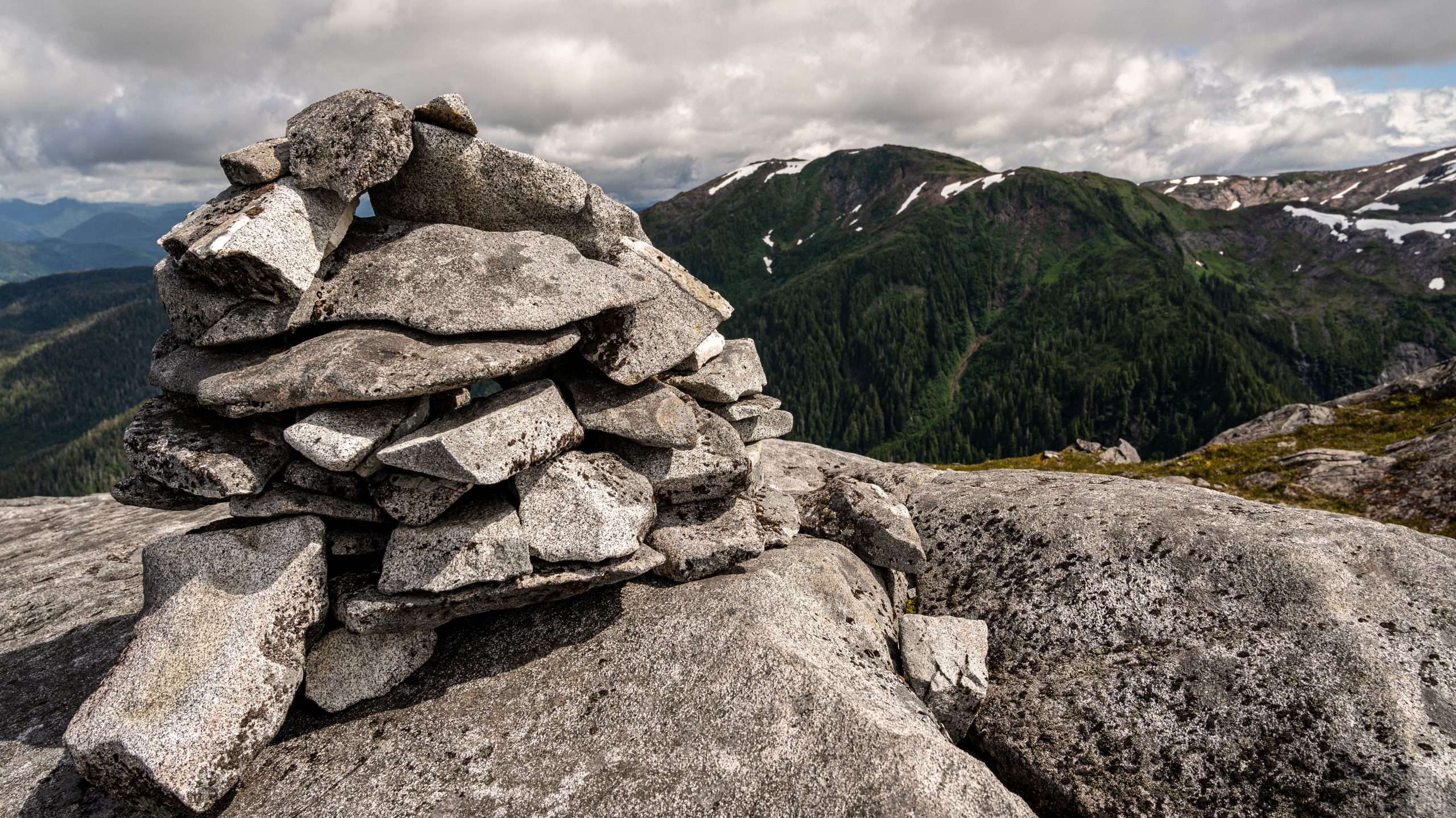
Blog > 2020 Contest-Winning Essay: Teague Whalen, “My Measuring Rock”
2020 Contest-Winning Essay: Teague Whalen, “My Measuring Rock”

Photo by Teague Whalen
On still days, Brown, Diane, and Ward Mountain reflect in Ward Lake as I walk the trail around the shore, where each morning I take the season’s pulse. The spring teams with returning life. A flock of Canadian geese rests on their migration north. A pair of trumpeter swans float in tandem, back to nest and mate. Skunk cabbage blooms. Ravens cluck and caw. A bald eagle chitters atop a Sitka spruce. From branch to branch, dark-eyed juncos flit and chirp where tufts of old man’s beard droop. Robins peck the ground; stellar jays screech, and black-capped chickadees repeat their name in onomatopoeia—chicka-dee dee dee. On rare occasions, a loon’s tremolo calls out; a great blue heron stalks the reeds; a beaver floats a log down Ward Creek, or a family of otters playfully roll about. Then one day, summer arrives to nourish. Salmonberry and thimbleberry bushes line the trail. Squirrels squeak and chatter, gather pinecones. Hooded mergansers, buffleheads, and mallards paddle and bob for breakfast. An American dipper pops in and out of the creek’s rapids. Late summer, salmon begin their run up-river to spawn and die, when at the tail end, fall brings decay and cleanses. Sheets of rain blow sideways and bronze the ground with leaves; snow crowns the alpine once again. Seagulls squawk while black bears patrol the shore, pick at the rotting salmon remains before the rains flood the banks. Gradually, winter’s darkening dormancy descends into the valley. Occasional bouts of snowfall track the past whereabouts of mink, deer, and wolves. On and off, the lake freezes; the ice expands; staccato cracks punctuate the quietude.
Walking through Ward Lake’s varying seasons helps me to weather my emotional landscape and to maintain a foundation of peace beneath each day. At the footbridge where Ward Creek drains out of the lake, a moss-backed rock—the size of Bigfoot’s meditation mat—sticks out of the rapids during the normal flow. After a good day of rain, the river will lap over half the rock. After two or three days of hard rain, the creek spills over the rock in a mini waterfall. After a week or more of nonstop rain, the rock disappears. When I’m drowning in nasty university politics and I want to quit and move away, sometimes this morning walk is my only joy. The worst times are when my heart is broken and I can’t find joy. Alone, I walk around Ward Lake, trying to trust in this daily practice if I can just keep moving forward. Though my feet step down the trail, my mind is often stuck in the past, still seeking her warm touch beside me as I suffer to make sense of why love sometimes needs to be let go.
My meditation practice teaches me that I need to skip my mind out of the looping track of what was, because the reality is that she is not coming back. Though I know we made the best decision, my heart does not want to let her go, fools my mind into keeping her memory alive. So, I recite a mantra that I created for whenever I realize I am spinning back to her again. I return to the present moment of what I am actually doing and simply say, “I am walking away . . .” After months of this—when the fall storms swell the creek, flood the lake, and wash away the stinking salmon carcasses from the banks—smoother days start surfacing above the rockier ones, and I begin shifting the mantra to: “I am walking toward . . .” Eventually, spring’s mountain snowmelt breaks apart the lake ice and funnels the chunks downstream to bob through the rapids a mile to dissolve in Ward Cove’s saltwater, and I begin to let the last bits of her go and become more hopeful of meeting someone new.
Eleventh-century, Japanese Zen-master and poet, Eihei Dōgen’s words—from a poem of his that I hold dear—have given me faith that a better day would one day resurface: “I have always known that at last I would take this road / But yesterday I did not know / It would be today.” Today, as I stand on the footbridge and look down at the rapids, the moss-backed rock sticks out of the water; the level returned to normal. May’s cool breeze hints of freshwater, pine, overturned earth; the whitewater tirelessly speaks of the cyclical movement of change; a choir of birdsong lifts my spirit to the blue sky; the sun warms my face with whispers of summer. I breathe deep this filling presence welcoming me home to the present moment, and I brim with morning’s joy. No more to or from. For now, just, “Walking . . .”
A native Michigander, Teague earned an MFA in English from Northern Michigan University. He is presently an associate professor of English and Communication at The University of Alaska Southeast.


